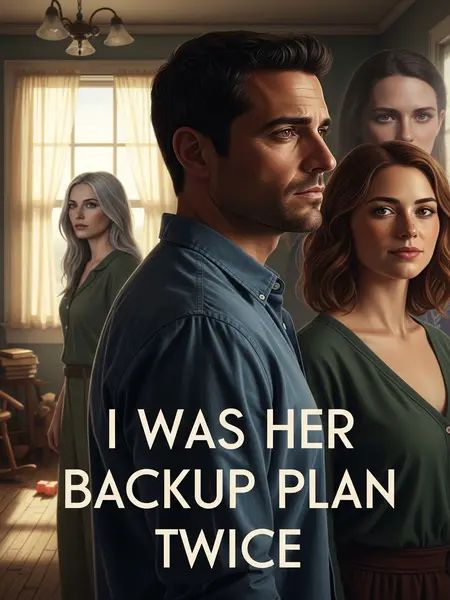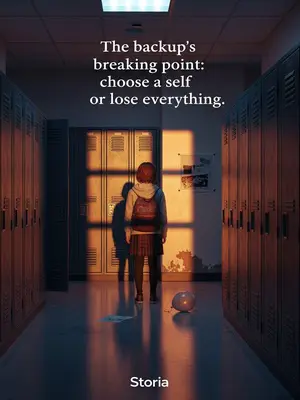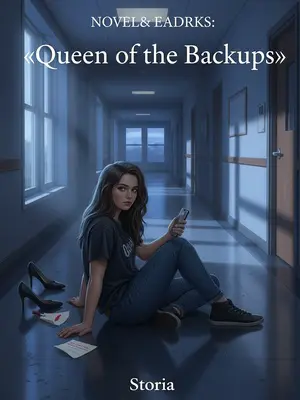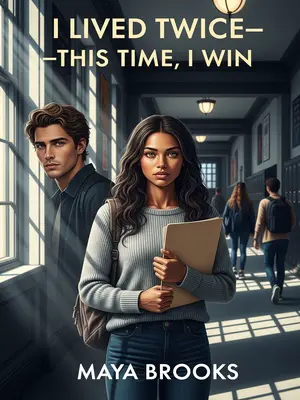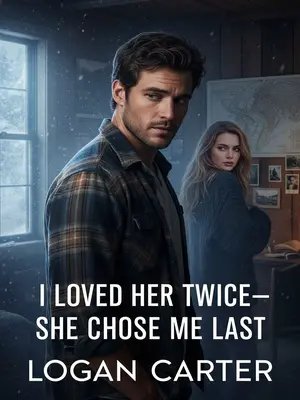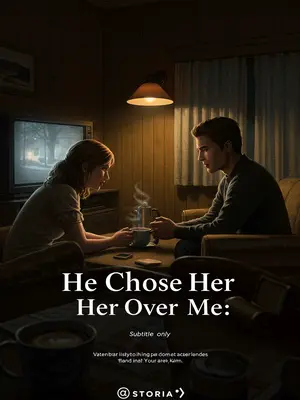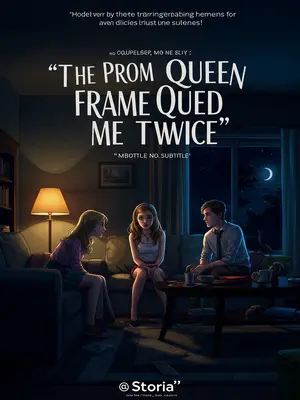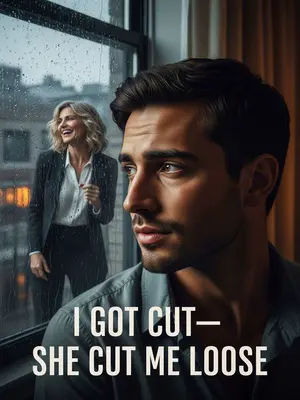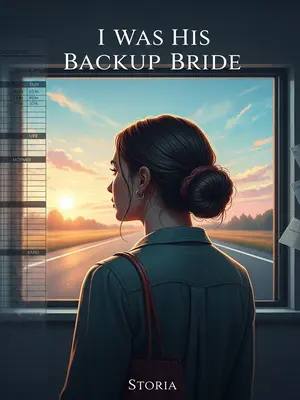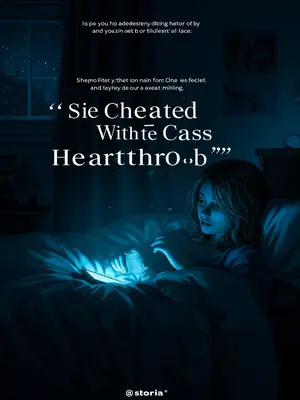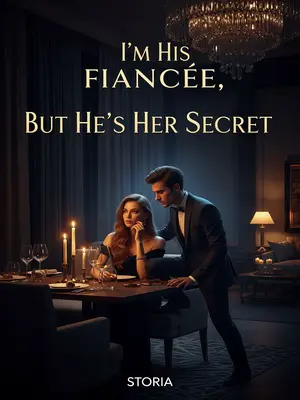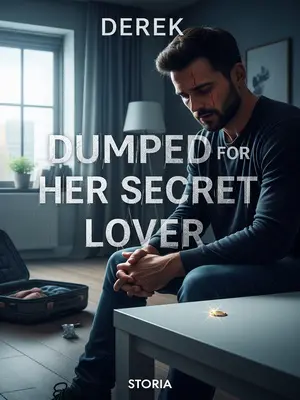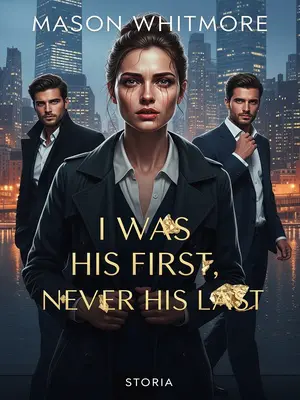Chapter 1: The Villain in My Own Story
I fell in love with the girl I helped through school—the one everyone in town called a charity case.
Even now, just thinking about that label makes my skin prickle. In a place like Maple Heights, where everyone’s business is public knowledge and your last name matters, 'charity case' clings to a kid like gum stuck under a church pew—impossible to scrape off. Folks would lean in at the diner, whispering behind chipped coffee mugs, or shoot her that sideways glance in the grocery store aisle, the kind that says, 'You don’t belong here.' But when I looked at her, I saw something more—something worth holding onto. I wanted to believe I could save her. Maybe I was just fooling myself.
She wanted to study, so I paid for her education. It started in junior high, then came SAT prep, and before I knew it, I was covering everything until she finished her master’s. I still remember the smell of old paper and dust when I handed her that first stack of prep books from the used bookstore on Main. She hugged them to her chest, eyes shining like she’d just unwrapped a new bike on Christmas morning—except there was something sharper, more hungry in her gaze. She never asked for anything, always worked quietly, always grateful—or at least, that’s what I told myself. Sometimes I’d catch the faint scent of vanilla from her shampoo, or the way her hand trembled just a little when she thanked me. I told myself I was just doing a good deed, but deep down, I needed to be her hero.
She cared about her family, so I used every connection I had to move her folks out of their run-down trailer park and into a real house. That place smelled like mildew and cold coffee, the kind of place where the wind whistled through paper-thin walls and the floor creaked under every step. I called in every favor, begged the bank manager, and finally got her parents into a little ranch with a real backyard and a porch swing. I’ll never forget the way her mom sobbed when she saw the place, or the way her dad just stood there, stunned, staring at the mailbox like it was a miracle. For a minute, I felt like I’d finally done something right.
She said she only wanted one child. I gave in to everything she wanted, pouring my whole heart into raising our daughter. I still remember the first time she held our baby—her arms strong but gentle, her face fierce and soft all at once. She was clear: one kid, no more. I said yes to everything, every single time. Every school play, every scraped knee, every late-night fever—I was there, thinking I was building something real, something that would last.
But it wasn’t until after she died—when our daughter insisted on moving my wife’s grave so she could be buried with her childhood sweetheart—that I finally learned the truth.
It was a cold spring day, the kind where the air smells like mud and hope, and the sky can’t decide if it wants to rain or shine. Our daughter stood in the cemetery, hands trembling but her voice steady as a judge. She looked at me with this strange mix of guilt and determination, like she was about to rewrite the whole story of our lives. That’s when it all came apart—right there among the headstones and wet grass.
Turns out, my wife never loved me. Her heart was never mine—it belonged to that boy she grew up with, her first love.
Tyler. His name was always floating around the edges of her life—at church, at the fair, in stories about high school. I used to think I was the center of her world, but really, I was just passing through. I was a detour. I thought I was the sun, but I was just a shadow crossing the sky.
Not only did I never have her heart—even the daughter I raised wasn’t mine.
That realization hit me like a punch to the gut. Every birthday candle, every whispered bedtime story, every time I bandaged a scraped knee—suddenly none of it belonged to me. The ache was bone-deep. I felt hollow, like someone had scooped out my insides and left nothing but skin.
Their love story became a legend in town. People couldn’t stop talking about it, even my own daughter—the girl I’d poured my soul into raising. Maple Heights loves a good story, and theirs was the stuff of small-town legend: childhood friends, torn apart by bad luck, sneaking around behind everyone’s backs, finally reunited. Folks talked about them like they were some kind of Romeo and Juliet, doomed but beautiful. Even my daughter, the one I’d called mine, got swept up in it like it was a fairytale.
And after a lifetime of sacrifice, I became the villain in their story—the guy who broke up true love. I couldn’t help but wonder: Was that all I’d ever been? Just the obstacle in their happy ending?
No one wants to be the bad guy, especially not in their own life. But there I was, painted as the villain, the cautionary tale parents whispered about over coffee at the diner. I could almost hear them: 'Don’t end up like him.'
Given a second chance, I stopped the sponsorship. I decided not to have anything to do with her ever again. I sat with that decision, let it settle in my bones. I wasn’t going to be a fool twice. Not for her. Not for anyone.
If life was going to hand me a do-over, I wasn’t about to play the fool twice. I told myself I’d walk away this time—protect my heart, protect my pride. No more charity, no more pretending to be the hero.
At the steakhouse after the SATs, Savannah was still Savannah—same nervous energy, same careful manners. The place was a local institution—red leather booths, waitresses who called you 'hon' no matter your age, and the smell of grilled onions lingering in the air. Savannah sat across from me, shoulders hunched, picking at her food like she was afraid it might disappear. Outside, the world could’ve been ending, and she wouldn’t have noticed.
She kept her head down. Cut her steak into tiny pieces. Ate slow, ate quiet. Every movement was deliberate, almost like she was performing a ritual she’d practiced a thousand times.
Her family was poor—sometimes she went hungry—so she knew better than to waste food. I felt a pang of guilt every time I saw her scrape her plate clean.
I’d seen her wrap up leftovers in napkins—sometimes she’d slip a roll into her purse for later. The smell of butter and yeast would follow her home. She never complained, never asked for seconds. She just ate what she was given, thanked you quietly, and moved on. There was a stubborn pride in the way she handled her hunger—like she wouldn’t let anyone see her struggle.
The first time I saw her eat, I thought it was just a quirk. But when I learned the real reason, my stomach twisted. I tried not to let it show, but the pity stuck with me, whether I wanted it or not.
That day, watching her eat in silence, I realized how little I really knew her. How many times had I assumed I understood her, when really, I was just scratching the surface? Loving someone isn’t the same as knowing them. I was always a step behind.
She was beautiful, but she rarely spoke first. If you caught her eye, you could tell there was a story in there—something deep, something she kept locked away. Sometimes I’d wonder: What was she hiding? What was she afraid I’d see?
She had this quiet magnetism. People always underestimated her, but I could feel the weight of secrets she carried—like she’d been through things I couldn’t even imagine. Every now and then, I’d catch her staring out the window, her face unreadable, and I’d think: What’s going on in that head of hers?
And sure enough, there was a secret—maybe more than one. Even after decades of marriage, I didn’t find out the truth until after she was gone. All those years, and I never really knew her.
Secrets have a way of festering. Ours grew like mold in the cracks, silent and persistent, until the whole foundation gave out. I used to think love was enough to hold everything together. Turns out, I was wrong—dead wrong.
Back when Savannah died, our daughter insisted on moving her grave so she could be buried with her childhood sweetheart. That was the moment everything changed.
It was surreal—watching my own flesh and blood fight for a love that had nothing to do with me. She spoke with such conviction, like she was finally righting a wrong that had haunted her since she was a kid. For a second, I wondered if I’d ever really known either of them.
I was stunned. My daughter, barely out of college, stood up on tiptoe and pointed at me—her voice shaking but sure:
“The one Mom loved all along was Tyler, her best friend since forever.”
Her words rang in my ears, sharp and final, like a bell at the end of a funeral. I wanted to argue, to say she was wrong—but one look at her face told me there was no point. She’d already made up her mind.
And my daughter—she was Tyler’s child. The truth landed like a punch. I stood there, reeling, the world tilting under my feet.
I’d always noticed a resemblance, but I chalked it up to coincidence. Now, it felt like the universe was pulling a cruel joke on me, just for fun.
They’d been together since their senior year of high school. It all made sense now, every late-night phone call, every odd silence at dinner.
All those late-night study sessions. The weekends she claimed she was 'visiting friends.' It was always Tyler. I was just the guy holding the door, letting her slip out the back.
All those years Savannah claimed she was studying or working out of town—it was just an excuse to be with Tyler, away from me. Looking back, I could see it clear as day. How had I missed it?
Looking back, all the signs were there—the missed calls, the unexplained absences, the way she’d come home with that far-off look in her eyes. I ignored them, desperate to believe in us. I wanted to believe love was enough.
She only married me because her family pushed her, because she needed a way out of poverty. The truth stung, but it was undeniable.
Her mom was relentless, always talking about 'security' and 'opportunity.' I thought I was rescuing her, but the truth was, I was just a rung on her ladder out. I was a means to an end, nothing more.
If I hadn’t had money, Savannah wouldn’t have looked at me twice. That realization left a bitter taste in my mouth.
That truth hurt more than anything. I was a lifeline, not a love story. The realization left me empty, like a shell washed up on the shore.
“I’m not Zoe Brooks. My name is Zoe Hayes!” My daughter’s voice cut through the cemetery air, as if she was declaring herself for the first time.
She stood tall, chin up, voice trembling but stronger than I’d ever heard it. For a moment, I saw her as her own woman, not just my little girl. When she said 'Hayes,' it sounded like she was daring the world to challenge her.
I stood there in shock, her words cutting through me like a knife. For a second, I couldn’t breathe. It felt like my whole chest was caving in. I wanted to reach for her, to pull her close, but she was already gone—at least in spirit.
So that’s how it was… My mind spun. I tried to make sense of it, but all I could do was stand there, numb.
I couldn’t help but laugh—a harsh, empty sound. The absurdity of it all hit me like a slap. Was this really my life?
The sound startled even me. It echoed in the cold air, the kind of laugh you hear at funerals when the only thing left is the punchline fate hands you.
Savannah’s family had nothing. She couldn’t afford school, so I sponsored her from middle school all the way through grad school. I thought I was changing her life.
I remembered every tuition check, every late-night drive to her campus, every call to the bursar’s office. I thought I was building a future for us. Turns out, I was just paving the road for someone else’s happy ending.
Because she cared about her family, I used every favor I could call in to help them out of that dying town. I did everything I could to give them a shot at something better.
I even got her brother a job at the factory, found her sister a scholarship. It was never enough. I kept giving, hoping that someday, maybe, she’d love me back. But that day never came.
Later, we got married. She said she only wanted one child. I agreed, giving in to her every wish, pouring all my love into raising our daughter. I thought that would be enough.
I still remember the vows we exchanged in that little white church on Maple Street. I meant every word. She just smiled and squeezed my hand, and I tried to convince myself that was love.
I held her close, tried to make her feel cherished, like she was the most important thing in my world. But looking back, maybe I was just holding on to an illusion.
Every anniversary, every holiday, I tried to show her how much she meant to me. But you can’t fill up someone’s heart if it’s already full of someone else. Love just spills out, wasted.
But in the end, I was just a stepping stone. That truth settled in, heavy and cold. I’d been nothing more than a stop on her journey.
I was the bridge she crossed to get where she wanted to go. Nothing more. I was just a footnote in her real story.
Even the daughter I’d raised for more than twenty years was Tyler’s. That realization knocked the wind out of me.
I’d memorized her laugh, her favorite foods, the way she scrunched her nose when she was mad. None of it was mine to keep. I felt like a stranger in my own life.
And she could be so moved by their love that she’d point at me—the man who raised her—and call me the villain who broke up true love. How’s that for a legacy?
That was the final blow. I was the outsider in my own family, the bad guy in a story I thought I was writing. The pain of that truth nearly broke me.
I slumped onto the couch, my hand shaking so badly I couldn’t even hold my glass of water. The glass rattled on the table, water sloshing over the rim.
The room spun. I gripped the armrest, trying to steady myself, but everything felt tilted, off-kilter, like the world had shifted under my feet.
“Bury them.” The words echoed in my ears, simple and cold. That was my daughter’s verdict, the punchline to my whole life.
Those two words summed up the joke of my whole life. I wanted to laugh, but all I felt was tired.
It was a command, a verdict, and a punchline all at once. I nodded, too tired to fight anymore. My hands felt numb.
“Savannah, since I made your whole life, I might as well do this one last thing for you.” My voice cracked, the words bitter in my mouth. It was the last act of a man who’d finally given up.
I said it out loud, voice cracking. There was a strange comfort in surrender, in letting go of the fight. Maybe this was what peace felt like—a kind of emptiness.
The day Savannah and Tyler were buried together, I died suddenly at home. No warning, no fanfare. Just silence, and the soft tick of the clock on the wall.
My daughter went to keep vigil at her real parents’ grave. I was left all alone—no family, no children. The house echoed with emptiness.
Even the dog wouldn’t come near me. The house was cold, empty. I stared at the ceiling for hours, waiting for something to change, for the ache to fade. It never did.
Nobody found me until my body had already started to rot. The smell must have been awful, but I never noticed. I was long gone.
It was the mailman who noticed first. By then, it was too late for anything but regret. The mailbox overflowed, and that was the only sign anyone cared.
